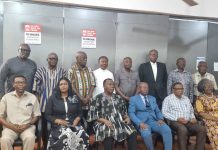Advocates for Community Alternatives (ACA) has launched a massive expansion of its community-driven development (CDD) work to one hundred communities in Ghana.
The project will put communities threatened by extractive development in control of their own development and give them the tools to advocate for their own vision of the future.
ACA’s community-driven development programs revolve around two key elements. The first element, the Facilitated Collective Action Process (FCAP), is a process that was developed and popularized in East Africa by ACA’s partner organization, Spark MicroGrants.
FCAP is a two-year program that encourages communities to create a common development vision and equips them with skills and financial resources – including a USD 9,000 microgrant – to pursue it.
Read Also: Stop womanising – Tobinco boss advises Medeama SC players
ACA has sponsored CDD projects in Ghana, Guinea, Liberia, and Sierra Leone.
Its FCAP work has helped communities build key infrastructure, including clinics and community centers, and jumpstart collective enterprises, such as rice farms and black soap manufacturing.
“Following the roll-out of FCAP in my community, Segyemase, we were first trained in how the whole process works. The training, among others, gave us more insight into how we, as a people, could come together, mobilize resources and, with one accord, take our destiny into our hands”, Emmanuel Akyeamadu, a beneficiary of FCAP in Segyemase near Osino said.
He added: “We came together as a community and contributed through communal labour to ensure cost-effectiveness in the execution of the CHPS Compound project, with ACA assisting with the cedi equivalent of $9,000 at the time, which was about Gh.c 52,000.”
The second element, Citizens’ Committee Network (CiCoNet) is ACA’s answer to the threat that our partner communities face from powerful economic interests.
Whereas FCAP gives communities hope for a better economic future, CiCoNet is an interface group of concerned citizens who help protect the communities’ development vision.
CiCoNet members are trained to speak with government officials and other stakeholders on behalf of their communities, raising concerns in ways that allow local authorities to help resolve key community concerns.
Through CiCoNet, our communities have won key victories, such as prompting the suspension of a highly polluting mining company’s operating permit and inducing companies to fill abandoned pits that endangered the welfare of children and livestock.
A CiCoNet member, Mr George Asante, who is a retired teacher and a farmer from Juaso had this to say: “First of all, we have been empowered because of CiCoNet to strengthen our collaboration with the district assembly and through that the assembly has even assured us of providing the Juaso community with potable water soon. Besides, our continuous engagements with Kibi Goldfields to reclaim some unused mining pits have yielded positive results as the company has begun refilling and reclaiming portions of the degraded lands. Many of our members have also been trained in various sustainable vocations and are now economically self-reliant.
The CDD expansion project, dubbed Oman Yie Die (an expression in Twi, a local Ghanaian language, which literally means community development), builds on these successes by introducing a new element: partnering with local Municipal and District Assemblies, which contribute a portion of the microgrant and are in turn trained to supervise and monitor FCAP initiatives.
ACA and the local authorities are hiring Community-Based Facilitators (CBFs) to run the FCAP process on a day-to-day basis in each village. When the project is finished, ACA will therefore leave behind trained staff and financial structures that allow local government authorities to continue promoting community-based development far into the future.
The first ten beneficiary communities are all in Ghana’s Eastern Region: Abompe, Saaman, Bososo, Kplandey, Nsutam, Dome, Dwenease and Heman in Fanteakwa South District; and Asikam and Ahwenease in Abuakwa South Municipality.
Thirty additional communities will be added by the end of this year and 60 more by the end of next year, including a number in Nkoranza South Municipality in Bono East Region. All communities will benefit from CiCoNet activities as well.
“By rolling out Oman yie die at scale, we will show that CDD is the most sustainable, cost-effective way to give wings to communities’ dreams for development and protect them from threats to their lives and livelihoods,” said Nana Ama Nketia-Quaidoo, ACA’s Community Development Director. “We want to see government authorities across Ghana cooperating with all of Ghana’s communities to make sure that local people are empowered to pursue their own vision for the future.
About ACA
Advocates for Community Alternatives (ACA) helps West African communities that are threatened by the destructive impacts of extractive projects to take control of their futures. ACA helps these communities to design their own sustainable development plans and bring them to life through advocacy, legal support, and technical expertise.
ACA currently works in nine West African countries namely, Cote d’Ivoire, Ghana, Guinea, Liberia, Mali, Niger, Nigeria, Senegal, and Sierra Leone.
Ghana | Atinkaonline.com






























